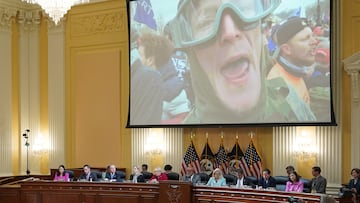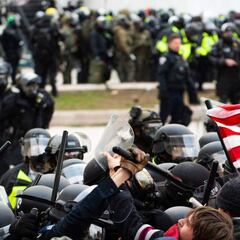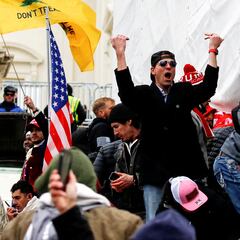This is what a group of retired generals and admirals said about Trump’s actions on Jan. 6
A group of retired generals and admirals urged Americans demand leaders put country over party and follow their oaths to protect American from all enemies.

A group of seven retired four-star generals and admirals in the US Armed Forces wrote an op-ed in the New York Times on July 21, 2022 telling Americans not to take their democracy for granted. Had former President Trump gone along with calls for him to “unlawfully” order the military to seize voting machines and oversee a do-over election that “would have imperiled a foundational precept of American democracy: civilian control of the military.”
“The strength of our democracy rests upon the stability of this arrangement,” the seven wrote. They also explained that because of their oaths that only the president or someone in the chain of command could legally give the order to respond to the assault on the Capitol on January 6.
Mike Pence: “President Trump asked me to put him over the Constitution…I really do believe that anyone who puts themself over the Constitution should never be president of the US.”
— Republicans against Trump (@RpsAgainstTrump) January 6, 2026
(August 2023)
pic.twitter.com/rhW0SYnxV3 https://t.co/bqpkEbi2c2
Trump’s dereliction of duty
The retired generals and admirals were startled by the findings of the January 6 House investigation, “but none to us more alarming than the fact that while rioters tried to thwart the peaceful transfer of power and ransacked the Capitol” Trump did nothing to stop the insurrection.
“The president and commander in chief, Donald Trump, abdicated his duty to preserve, protect and defend the Constitution,” read the op-ed. “The president’s dereliction of duty on Jan. 6 tested the integrity of this historic principle as never before, endangering American lives and our democracy.”
Five years ago, a mob of insurrectionists — fueled with conspiracies and lies, and incited to violence by a mendacious conman clinging to power — stormed the Capitol. It was a Day of Infamy.
— Charlie Sykes (@SykesCharlie) January 5, 2026
But now — five years later —we know that the infamy was just beginning — a cascading… pic.twitter.com/BKOYhMqWh5
The chain of command
One of the glaring faults of the 187 minutes of inaction by Trump, which the House January 6 committee is showing was by design, was the failure to send in the National Guard to help reinforce the embattled police officers fighting “medieval combat,” as it has been described.
That terrible day offered “a demonstration on how military and civilian leaders execute this relationship and what happens when it comes under threat,” the seven retired four-stars said. “When a mob attacked the Capitol, the commander in chief failed to act to restore order and even encouraged the rioters.”
A very sad day in history that the entire world watched on TV, in real time.
— Marlene Robertson🇨🇦 (@marlene4719) January 5, 2026
Video credit ~ @CoryBooker
pic.twitter.com/yxMaj8MsVJ
In the void reated in the chain of command, former Vice President Mike Pence called General Mark Milley to ask for the National Guard to intervene. According to the retired generals and admirals “Mr. Pence’s request was reasonable.”
However, he was not the commander in chief, nor in the chain of command “unless specifically acting under the president’s authority because of illness or incapacitation.” Any order emanating from Pence would have been unlawful, and the military “cannot unilaterally undertake a mission.”
The same applies in their explanation for the other civilian leaders in Congress that made pleas for troops to be sent to put an end to the insurrection. The National Guard only deployed when a “lawful” order was given by then acting secretary of defense, Christopher Miller.
January 6, 2021, U.S. Capitol, five years ago tomorrow (Getty): pic.twitter.com/tL45tZDuzo
— Michael Beschloss (@BeschlossDC) January 5, 2026
Lawful versus unlawful orders
They explained that it is the civilian authorities “constitutional and legal right and responsibility,” to determine when and where to use military force. The military officers have the “duty to provide candid, expert advice on how to use such force” and have taken an oath to “obey all lawful orders, whether we agreed or not.”
They hope such a crisis will never face the country again but that military leaders should be prepared for similar situations “to safeguard our constitutional order.” Of special concern are governors who “possess broad command authority over our 54 National Guard organizations.” They worry that political pressure could be brought to bare on these individuals to “illegally interfere with elections or other democratic processes.”
Related stories
“Should civilians atop the chain of command again abandon their duties or attempt to abuse their authority, military ranks can and must respond in accordance with their oaths.” They write. “Without a lawful order from appropriate command authority, they cannot unilaterally undertake a mission.”
Adding, “Concurrent with a duty to obey all lawful orders is a duty to question and disobey unlawful orders.”



Complete your personal details to comment